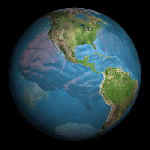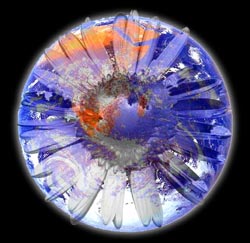|
Connection Tunnels
Synthetic Pleasures
Pisces At The Beach
Madness
Highlight Quotes
"We are in a time of changes. Species will pass away and others take
their place, as has happened before. An ecosystem frozen in stone can only become a fossil. We
must become smart enough to minimize the damage, and then foster a new diversity, one able to
endure in a strange new world." "Knowledge isn't restrained by the limits of Malthus.
Information doesn't need topsoil to grow in, only freedom. Given eager minds and
experimentation, it feeds itself like a chain reaction." "What do you get when you mix utter
ignorance and a mind able to ask, 'Why'? Early human societies grasped at so many
superstitions, pagan hierarchies, and countles bizarre notions about the world. Some folkways
were harmless, even pragmatic and wise. Others were passed on as fierce 'truth'...because not to
believe fiercely opened the way to something far worse that error...uncertainty."
-- Earth, David Brin
TAKE IT BACK by Pink Floyd:
"Her love rains down on me easy as the breeze
I listen to her breathing it sounds like the waves on the sea
I was thinking all about her, burning with rage and desire
We were spinning into darkness, and the Earth was on fire
She could take it back, she might take it back some day
So I spy on her, I lie to her, I make promises I cannot keep
Then I hear her laughter rising, rising from the deep
And I make her prove her love to me, I take all that I can take
And I push her to the limit to see if she would break
She might take it back, she could take it back some day
Now I've seen the warnings, screaming from all sides
It's easy to ignore them and God knows I've tried
All of this temptation, it turned my faith to lies
Until I couldn't see the danger or hear the rising tide
She can take it back, she will take it back someday
She will take it back, she will take it back someday."
|
|
Highlight

I've lived long enough to understand how difficult adaptation can be when change accelerates
beyond our ability to comprehend it, when what gives value to our lives is swept away, and
when personal relationships seem ever more fragile. [In David Brin's novel Earth...] The earth of 2038 is much closer to the
brink than ours, and even more deeply enmeshed in rapid change. It's also more closely linked
than ours, by the World Net, the globe-spanning great grandchild of our World Wide Web.
Everyone has a voice, even if it is more difficult to be heard. New relationships, new ways of
thinking and acting are constantly being spawned, a new world in the making.
I listen to the voices of doom and the prophets of hope and realize that neither side really knows
what is happening or what the future will be like. I try, like some of Brin's characters, to remain
open, willing to surf the changes rather than resist them. I want to experience both the fear and
the exhiliration of the new and strange. Who said there are no frontiers left?
Deeper

Brin's novel reminds me that each of us recapitulates
the arguments for and against Descartes' I/It dualism, a position that enabled the West to
dominate the world. Now that I/It relationship is seen as destructive in ways that humans could
not have foreseen. But every process contains the seeds of a new creation. In EARTH, the world
of 2038 is different from ours in detail, but illustrates the same processes. Personal reactions to
those processes range, as they do now, from wisdom to fanaticism, peace-making to violent
overthrow, acceptance to withdrawal.
Follow Ups
From my perspective this move is completely related to the Gaia hypothesis popularized and modernized by James Lovelock. Peter Russell in his book "The Global Brain," describes Lovelocks development of the theory as follows, "Lovelock found that the chemical constituents [of the Earth] were far removed from equilibrium.....Lovelock came to 'the only feasible explanation': the atmosphere is being manipulated on a day to day basis by the many living processes on Earth. The entire range of living matter on Earth, from viruses to whales, from algae to oaks, plus the air, oceans, and the land surface, all appear to be a part of a giant system able to regulate the temperature and composition of the air, sea, and soil so as to ensure the survival of the life. This term Lovelock called the 'Gaia Hypothesis' in honer of the ancient Greek 'Earth Mother', Gaia (or Ge). In this context Gaia signifies the entire biosphere - everything living on the planet - plus the atmosphere, the oceans and the soil. "

So the living systems are necessary to regulate the livability of the Earth the same way that our systems regulate our body temperature, supplies, etc. Russell's 'Global Brain' idea is the most exiting to me. He hypothesizes that human beings work like the brain cells in the living system of the Earth. For a good while brain cells increase in a developing fetus until a certain point where further expansion would be an overpopulation of brain cells. From that point on the brain cells in the baby and the growing person grow in connectivity. Russell points out that we have reached a point of maximum expansion in human population and that our activities are increasing towards connectivity as we get closer and closer with overnight mail, radio, telephones, television, satellites, FAXes, computers, etc.
He also points out that our selfish behavior as a species is like cancerous behavior. Alan Watts called this selfish, isolated behavior "The Skin Encapsulated Ego." Russell goes on to explain it as, "What's inside the skin is me. What's outside the skin is not me. Biologically this is true. We are each separate biological individuals. But it is not the whole truth. We are much more than that. We are creatures with an inner life. With an existence that streches beyond our biological identity."
He points out how difficult it is to define ourselves without describing our attachments to the world and that a lot of our destructive behavior toward the world stems from our seeing the world as external to us. What is needed is a shift in perspective and in being. A way of seeing our "fuzzy borders" that allow air and food and waste and the world to flow in and out and that we are part of and connected to the whole world.
I think Peter is probably the most eloquent and balanced thinker on the subject of human development and survival today. He is one of the most spiritually and intellectually balanced individuals I have ever met. I have taken away from my interactions with his thinking that wisdom must no longer dissipate in a wasteland were the mundane is equated with the noble. Wisdom must connect up with wisdom and increase the strength of its messages. Connections and more connections are critical for balanced messages to meet up. We need to look into each others eyes and know that we are looking at ourselves and the universe that created us and know that we are responsible for creating the future of that universe, the future of ourselves.
--Robert C. Cohen.
|






